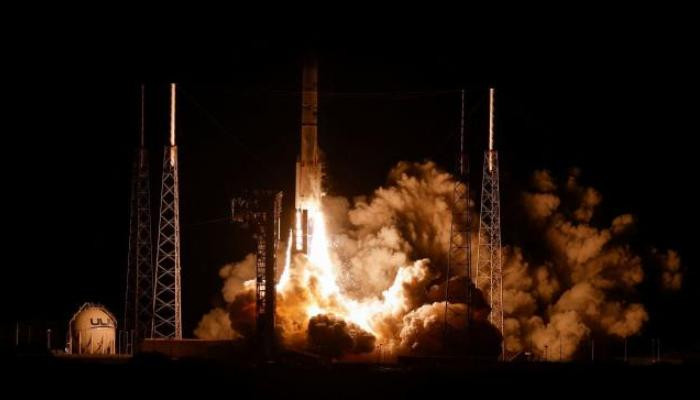First U.S. Lunar Lander in 50 Years Blasts Off Toward the Moon
 The first U.S. lunar lander in more than 50 years rocketed toward the moon Monday, launching private companies on a space race to make deliveries for NASA and other customers. Astrobotic Technology's lander caught a ride on a brand new rocket, United Launch Alliance’s Vulcan. The Vulcan streaked through the Florida predawn sky, putting the spacecraft on a roundabout route to the moon that should culminate with an attempted landing on Feb. 23. “So, so, so excited. We are on our way to the moon!” Astrobotic chief executive John Thornton said. The Pittsburgh company aims to be the first private business to successfully land on the moon, something only four countries have accomplished. But a Houston company also has a lander ready to fly, and could beat it to the lunar surface, taking a more direct path. NASA gave the two companies millions to build and fly their own lunar landers. The space agency wants the privately owned landers to scope out the place before astronauts arrive while delivering NASA tech and science experiments as well as odds and ends for other customers. Astrobotic's contract for the Peregrine lander: $108 million. The last time the U.S. launched a moon-landing mission was in December 1972. Apollo 17’s Gene Cernan and Harrison Schmitt became the 11th and 12th men to walk on the moon, closing out an era that has remained NASA’s pinnacle. The space agency’s new Artemis program — named after the twin sister of Apollo in Greek mythology — looks to return astronauts to the moon’s surface within the next few years. First will be a lunar fly-around with four astronauts, possibly before the end of the year. Highlighting Monday's moonshot was the long-delayed initial test flight of the Vulcan rocket from Cape Canaveral Space Force Station. The 202-foot (61-meter) rocket is essentially an upgraded version of ULA’s hugely successful workhorse Atlas V, which is being phased out along with the company’s Delta IV. Jeff Bezos' rocket company, Blue Origin, provided the Vulcan's two main engines. ULA declared success once the lander was free of the rocket's upper stage, nearly an hour into the flight. “Yee-haw!” shouted chief executive Tory Bruno. "I am so thrilled, I can’t tell you how much.” The Soviet Union and the U.S. racked up a string of successful moon landings in the 1960s and 70s, before putting touchdowns on pause. China joined the elite club in 2013 and India in 2023. But last year also saw landers from Russia and a private Japanese company slam into the moon. An Israeli nonprofit crashed in 2019. Next month, SpaceX will provide the lift for a lander from Intuitive Machines. The Nova-C lander's more direct one-week route could see both spacecraft attempting to land within days or even hours of one another. The hourlong descent to the lunar surface — by far the biggest challenge — will be “exciting, nail-biting, terrifying all at once,” Thornton said. |
















